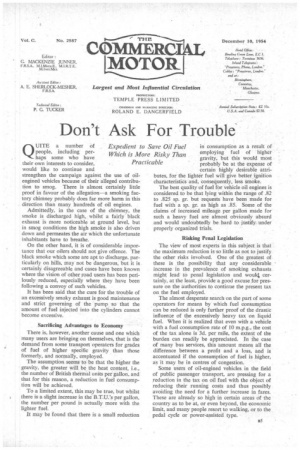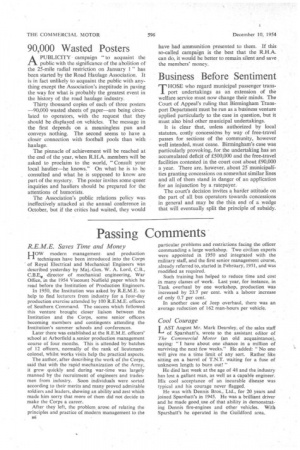Don't Ask For Trouble
Page 39

Page 40

If you've noticed an error in this article please click here to report it so we can fix it.
QUITE a number of people, including perhaps some who have their own interests to consider, would like to continue and strengthen the campaign against the use of oil engined vehicles because of their alleged contribution to smog. There is almost certainly little proof in favour of the allegation—a smoking factory chimney probably does far more harm in this direction than many hundreds of oil engines.
Admittedly, in the case of the chimney, the smoke is discharged high, whilst a fairly black exhaust is more noticeable at ground level, but in smog conditions the high smoke is also driven down and permeates the air which the unfortunate inhabitants have to breathe.
On the other hand, it is of considerable importance that our oilers should not give offence. The black smoke which some are apt to discharge, particularly on hills, may not be dangerous, but it is certainly disagreeable and cases have been known where the vision of other road users has been perilously reduced, especially where they have been following a convoy of such vehicles.
It has been said that the cure for the trouble of an excessively smoky exhaust is good maintenance and strict governing of the pump so that the amount of fuel injected into the cylinders cannot become excessive.
Sacrificing Advantages to Economy There is, however, another cause and one which many users are bringing on themselves, that is the demand from some transport operators for grades of fuel of higher specific gravity than those formerly, and normally, employed.
The assumption seems to be that the higher the gravity, the greater will be the heat content, i.e., the number of British thermal units per gallon, and that for this reason, a reduction in fuel consumption will be achieved.
To a limited extent, this may be true, but whilst there is a slight increase in the B.T.U.'s per gallon, the number per pound is actually more with the lighter fuel.
It may be found that there is a small reduction in consumption as a result of employing fuel of higher gravity, but this would most probably be at the expense of certain highly desirable attributes, for the lighter fuel will give better ignition characteristics and, consequently, less smoke.
The best quality of fuel for vehicle oil engines is considered to be that lying within the range of .82 to .825 sp. gr. but requests have been made for fuel with a sp. gr. as high as .85. Some of the claims of increased mileage per gallon made for such a heavy fuel are almost obviously absurd and would undoubtedly be hard to justify under properly organized trials.
Risking Penal Legislation The view of most experts in this subject is that the maximum reduction is so little as not to justify the other risks involved. One of the greatest of these is the possibility that any considerable increase in the prevalence of smoking exhausts might lead to penal legislation and woul4 certainly, at the least, provide a good excuse for pressure on the authorities to continue the present tax on the fuel employed.
The almost desperate search on the part of some operators for means by which fuel consumption can be reduced is only further proof of the drastic influence of the excessively heavy tax on liquid fuel. When it is realized that even with a vehicle with a fuel consumption rate of 10 m.p.g., the cost of the tax alone is 3d. per mile, the extent of the burden can readily be appreciated. In the case of many bus services, this amount means all the difference between a profit and a loss, and is accentuated if the consumption of fuel is higher, as it may be in centres of congestion.
Some users of oil-engined vehicles in the field of public passenger transport, are pressing for a reduction in the tax on oil fuel with the object of reducing their running costs and thus possibly avoiding the need for a further increase in fares. These are already so high in certain areas of the country as to be at, or even beyond, the economic limit, and many people resort to walking, or to the pedal cycle or power-assisted type.
90,000 Wasted Posters
APUBLICITY • campaign "to acquaint the public with the significance of the abolition of the 25-mile radial restriction on January 1" has been started by the Road Haulage Association. It is in fact unlikely to acquaint the public with anything except the Association's ineptitude in paving the way for what is probably the greatest event in the history of the road haulage industry.
Thirty thousand copies of each of three posters —90,000 wasted sheets of paper—are being circulated to operators, with the request that they should be displayed on vehicles. The message in the first depends on a meaningless pun and conveys nothing. The second seems to have a closer connection with football pools than •with haulage.
The pinnacle of achievement will be reached at the end of the year, when R.H.A. members will be asked to proclaim to the world, "Consult your local haulier—he knows." On what, he is to be consulted and what he is supposed to know are part of the mystery. The poster invites some queer inquiries and hauliers should be prepared for the attentions of humorists.
The Association's public relations policy was ineffectively attacked at the annual conference in October, but if the critics had waited, they would have had ammunition presented to them. If this so-called campaign is the best that the R.H.A. can do, it would be better to remain silent and save the members' money.
Business Before Sentiment
Fr HOSE who regard municipal passenger trans ]. port undertakings as an extension of the welfare service must now change their minds. The Court of Appeal's ruling that Birmingham Transport Departrhent must be run as a bUsiness venture applied particularly to the case in question, but it must also bind other municipal undertakings.
It is clear that, unless authorized by local statutes, costly concessions by way of free-travel passes for sections of the community, however well intended; must cease. Birmingham's case was particularly provoking, for the undertaking.has an accumulated deficit of £500,000 and the free-travel facilities contested in the court .cost about £90,000 a year. There are, however, about 25 municipallties granting concessions on somewhat similar lines and all of them stand in danger of an application for an injunction by a ratepayer.
The court's decision invites a harder attitude on the part of all bus operators towards concessions in general and may be the thin end of a wedge that will eventually split the principle of subsidy.




















































































































